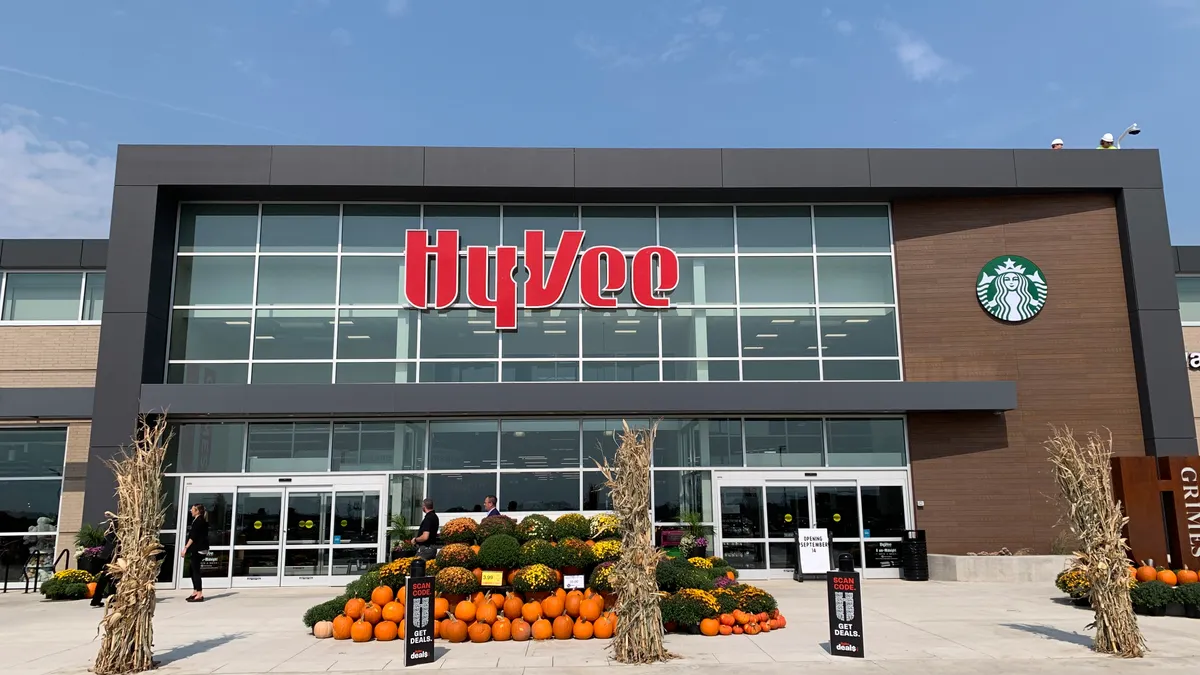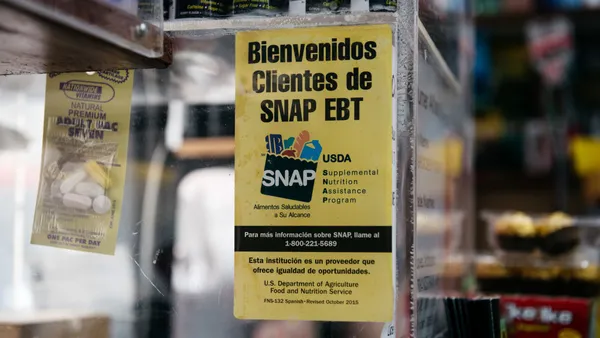Dive Brief:
- Hy-Vee is looking to cut up to 500 corporate jobs and relocate those workers to store-level positions, the company said in an unsigned letter published in the Des Moines Register earlier this week.
- Citing high construction costs, Hy-Vee said it is also pausing several projects, including a new warehouse in Cumming, Iowa, and “evaluating its existing land parcels” to determine if they still align with its growth plans. A company spokesperson said Hy-Vee still plans to continue with its previously announced expansion in the Southeast.
- The letter said that inflation, supply chain pressures and rising fuel costs have weighed on the company, and noted that Hy-Vee is focused on becoming “as lean as possible” and offering better deals for shoppers.
Dive Insight:
Hy-Vee’s advertorial, which ran on Wednesday, goes to great pains in detailing the pressures the company and other grocers are facing right now. The piece, which runs more than 1,000 words, presents detailed points on inflation, its impact on consumer spending and the likelihood of a recession. It also rattles off a number of other challenges the company is facing, including supply chain disruption and labor shortages, offering a strikingly candid and detailed account to readers.
In one lengthy paragraph, the letter even details how pharmacy remuneration fees have cost Hy-Vee more than $100 million so far this year.
“Hy-Vee and other retailers across the nation are currently facing a number of obstacles, from rising inflation and increasing fuel costs, to supply chain disruptions and more,” the advertorial states. “But that may just be the beginning.”
Supply chain disruptions, rising fuel prices and difficulties staffing stores and warehouses are at the heart of the storm of challenges that retailers across the country are grappling with more than two years into the pandemic. But Hy-Vee appears to be particularly vulnerable to the pinch consumers are feeling on their wallets right now. Known industry-wide for its innovative spirit and customer service focus, the company — by its own admission — isn’t known for having low prices. That makes it vulnerable to the many value-price operators across its Midwestern operating footprint, like Walmart, Aldi, Save A Lot and Dollar General, that are turning up the volume on their price promotions at a time of high food-at-home prices.
Hy-Vee has tried to head these challenges off in recent years by rolling out its own dollar store format, adding more low-price signage in stores and adding regular deals pegged to its digital circular. As the advertorial notes, it has added more weekly and daily deals for shoppers and expanded the rewards offered through its fuel loyalty program.
The company says it needs to do more.
“As prices rise across the country, our top priority has to be centered on fighting to get the best deals possible for our customers,” Jeremy Gosch, Hy-Vee’s president and chief retail officer, stated in the piece. “In order to do that, we must find other ways to cut expenses.”
By moving corporate employees into store-level roles, Hy-Vee is hoping to cut expenses and address labor challenges. The company spokesperson said there are currently around 400 store leadership positions open across its eight-state footprint in addition to other full-time roles. The advertorial noted that many corporate employees started in store roles and have the necessary experience to fill open positions, and said it will offer incentives and moving bonuses to “entice more office employees to relocate to its retail stores.”
The company spokesperson said Hy-Vee invited all of its corporate office employees this week to attend an internal job fair aimed at shifting employees into the retail leadership roles. In early March, the company eliminated more than 100 corporate jobs and offered retail roles to most of those workers, according to local news station KCCI.
Hy-Vee has implemented other cost-cutting measures as well, like shifting Aisles Online operations to locations where demand is the highest “in order to maximize its efforts,” according to the advertorial.
The piece cited other cost-cutting steps the grocer has taken in recent years, like reducing 24-hour service at its stores and restructuring its leadership to add district store director and store manager positions.
Hy-Vee is also taking a hard look at its planned stores. Earlier this month, the Pioneer Press reported that the grocer had canceled plans for several additional stores in the Twin Cities market because those projects did not align with the 150,000-square-foot stores the company plans on building going forward. Those outlets, which are larger than traditional Hy-Vee locations, have more space dedicated to online shopping operations and other offerings, the paper reported.
That scrutiny could eventually extend to the stores Hy-Vee is planning to build outside of its core operating region over the next few years. The company has confirmed that it plans to open stores in Kentucky, Indiana, Tennessee and Alabama, and has so far issued store announcements for locations in Louisville, Kentucky; Zionsville, Indiana; and Spring Hill, Tennessee. The Des Moines Register reported in December that the company plans to build more than 20 locations across four states, including a distribution center in Tennessee.
For now, the Hy-Vee spokesperson said the expansion plan is moving forward, but didn’t offer specifics.
“Our expansion in the southeast is still going to occur, but specific opening dates for those stores have not yet been announced,” the spokesperson said in an email.













